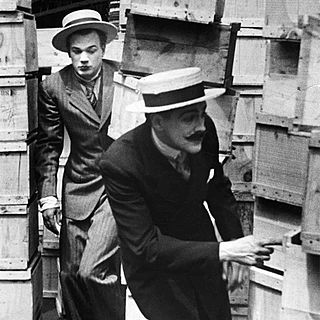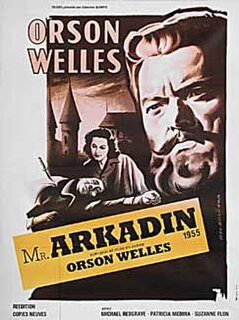
The Spirit of St. Louis is the custom-built, single-engine, single-seat, high-wing monoplane that was flown by Charles Lindbergh on May 20–21, 1927, on the first solo nonstop transatlantic flight from Long Island, New York, to Paris, France, for which Lindbergh won the $25,000 Orteig Prize.
Oja Kodar is a Croatian actress, screenwriter and director known as Orson Welles's partner during the later years of his life.

Too Much Johnson is a 1938 American silent comedy film written and directed by Orson Welles. An unfinished film component of a stage production, it was made three years before Welles directed Citizen Kane, but it was never publicly screened. It was shot to be integrated into Welles's Mercury Theatre stage presentation of William Gillette's 1894 comedy, but the film sequences could not be shown due to the absence of projection facilities at the venue, the Stony Creek Theatre in Connecticut. The resulting plot confusion reportedly contributed to the stage production's failure.

Mr. Arkadin, known in Britain as Confidential Report, is a French-Spanish-Swiss coproduction film, written and directed by Orson Welles and shot in several Spanish locations, including Costa Brava, Segovia, Valladolid and Madrid. Filming took place throughout Europe in 1954, and scenes shot outside Spain include locations in London, Munich, Paris, the French Riviera and at the Château de Chillon in Switzerland.

The Spirit of St. Louis is a 1957 aviation biography film in CinemaScope and Warnercolor from Warner Bros., directed by Billy Wilder, produced by Leland Hayward, and starring James Stewart as Charles Lindbergh. The screenplay was adapted by Charles Lederer, Wendell Mayes, and Billy Wilder from Lindbergh's 1953 autobiographical account of his historic flight, which won the Pulitzer Prize in 1954.

The Trial is a 1962 drama film directed by Orson Welles, who also wrote the screenplay based on the 1925 posthumously published novel of the same name by Franz Kafka. Welles stated immediately after completing the film: "The Trial is the best film I have ever made". The film begins with Welles narrating Kafka's parable "Before the Law" to pinscreen scenes created by the artist Alexandre Alexeieff. Anthony Perkins stars as Josef K., a bureaucrat who is accused of a never-specified crime, and Jeanne Moreau, Romy Schneider, and Elsa Martinelli play women who become involved in various ways in Josef's trial and life. Welles plays the Advocate, Josef's lawyer and the film's principal antagonist.
Moby Dick is a two-act drama by Orson Welles. The play was staged June 16–July 9, 1955, at the Duke of York's Theatre in London, in a production directed by Welles. The original cast included Welles, Christopher Lee, Kenneth Williams, Joan Plowright, Patrick McGoohan, Gordon Jackson, Peter Sallis, and Wensley Pithey. The play was published by Samuel French in 1965.

The Other Side of the Wind is a 2018 experimental satirical drama directed, co-written, co-produced and co-edited by Orson Welles, posthumously released in 2018 after more than 40 years in development. The film stars John Huston, Bob Random, Peter Bogdanovich, Susan Strasberg, and Oja Kodar.

Filming Othello is a 1978 documentary film directed by and starring Orson Welles about the making of his award-winning 1951 production Othello. The film, which was produced for West German television, was the last completed feature film directed by Welles.
The Dreamers is an unfinished film project directed and produced between 1980 and 1982 by Orson Welles. Adapted from Karen Blixen stories, Welles co-wrote a script with his companion Oja Kodar and filmed a few scenes but was unable to complete the film due to financing problems.
Don Quixote is an unfinished film project written, co-produced and directed by Orson Welles. Principal photography took place between 1957 and 1969. Test footage was filmed as early as 1955, second-unit photography was done as late as 1972, and Welles was working on the film intermittently until his death in 1985. The film was eventually edited by Jesús Franco and was released in 1992, to mixed reviews.
The Deep is an unfinished film directed by Orson Welles, based on Charles Williams' novel Dead Calm (1963), which was later adapted as an eponymous 1989 film. Welles produced and wrote The Deep, as well as played the role of Russ Brewer opposite Jeanne Moreau and Laurence Harvey.

The Merchant of Venice is a 1969 drama short film directed by Orson Welles based on William Shakespeare's play of the same name. While actually completed, it is frequently cited as an unfinished film, though better described as a partially lost film due to the loss of film elements.
Vienna is a 1968 short film directed by Orson Welles. It was originally produced as part of his abandoned television special, Orson's Bag, which was made for CBS; but in 1969, with the project close to completion, CBS withdrew their funding over Welles' long-running disputes with US authorities regarding his tax status. The film remained uncompleted. Despite its name, Vienna freely mixes footage shot in Vienna, Zagreb, and in a Los Angeles studio. The 8-minute segment was restored by the Munich Film Museum in 1999.
Filming 'The Trial' is an unfinished making-of film by Orson Welles, made in 1981, which focuses on the production of his 1962 film The Trial.
Orson Welles' Magic Show is an unfinished television special by Orson Welles, filmed between 1976 and 1985. In it, Welles performs various magic tricks for the camera, promising that no trick photography is used.
One Man Band, also known as London and Swinging London is an unfinished short film made by Orson Welles between 1968 and 1971. The film started life as a part of a 90-minute TV special for CBS, entitled Orson's Bag, consisting of Welles' 40-minute condensation of The Merchant of Venice, and assorted sketches around Europe. This was abandoned in 1969 when CBS withdrew its funding over Welles' long-running disputes with US authorities regarding his tax status, and Welles continued to fashion the footage in his own style.
Nella terra di Don Chisciotte is an Italian-language documentary travelogue series about Spain, made by Orson Welles. It began filming in 1961, but did not air until 1964. The series follows Welles' travels around Spain, and was narrated by Arnoldo Foà. The series was made for Radiotelevisione Italiana (RAI-TV). Co-starring with Welles were his Italian wife Paola Mori, and their young daughter Beatrice Welles.
Moby Dick is an unfinished film by Orson Welles, filmed in 1971. It is not to be confused with the incomplete 1955 film Welles made of his meta-play Moby Dick—Rehearsed, or with the 1956 film Moby Dick, in which Welles played a supporting role.
An Evening with Orson Welles is a series of six short films created in 1970 by Orson Welles, for the exclusive use of Sears, Roebuck & Co. Welles produced the recitations of popular stories for Sears's Avco Cartrivision machines, a pioneering home video system. Four of the films are regarded as lost; as of 2022, two of the films, The Golden Honeymoon and Two Wise Old Men: Socrates and Noah, are known to exist.







